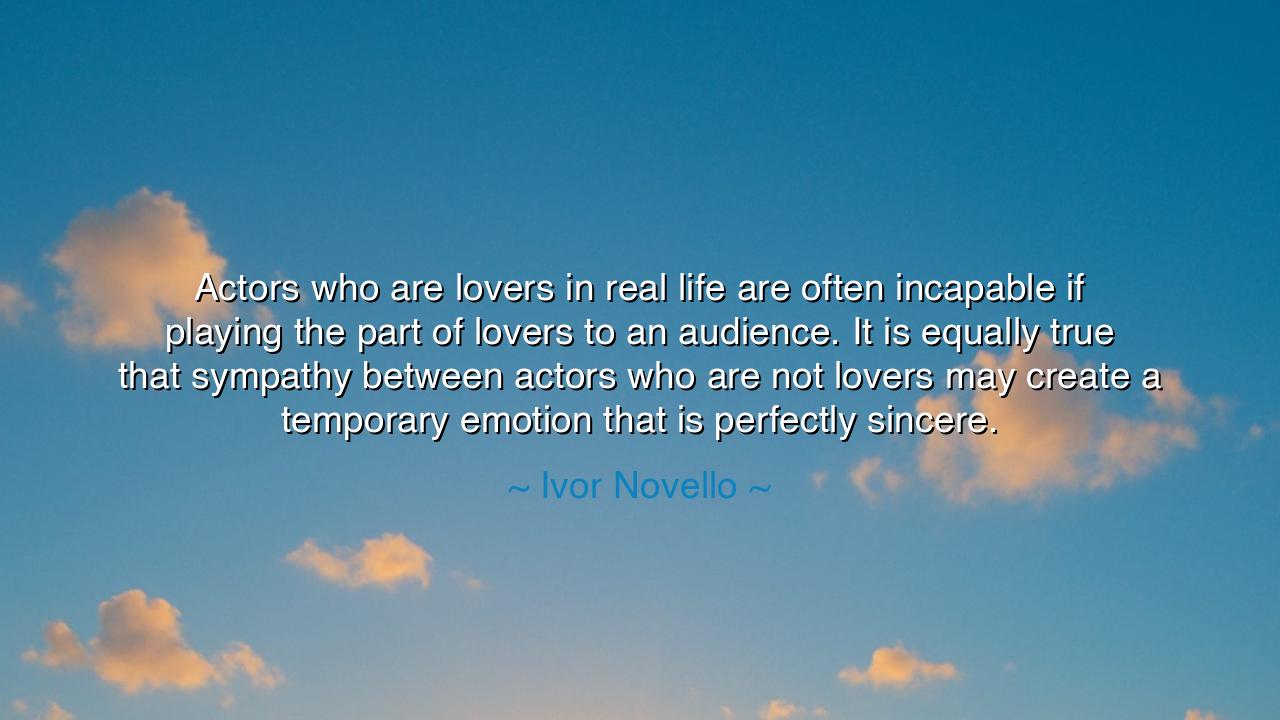
Actors who are lovers in real life are often incapable if
Actors who are lovers in real life are often incapable if playing the part of lovers to an audience. It is equally true that sympathy between actors who are not lovers may create a temporary emotion that is perfectly sincere.






Hear the words of Ivor Novello, composer, playwright, and actor of great renown, who observed with piercing clarity the mysteries of art and love: “Actors who are lovers in real life are often incapable of playing the part of lovers to an audience. It is equally true that sympathy between actors who are not lovers may create a temporary emotion that is perfectly sincere.” In this saying, Novello lifts the veil on the paradox of the stage: that reality and performance are not the same, and that truth in art arises not from fact, but from the shared creation of emotion.
The meaning of his words lies in the tension between private love and public illusion. Two actors who are true lovers may find their intimacy too fragile, too sacred, to expose before the gaze of an audience. What they share in reality does not translate easily into art, for it belongs to them alone, unshaped by the demands of performance. Yet two actors who are not bound in love may, through sympathy, through the alchemy of collaboration, kindle an emotion on the stage or screen that feels utterly real. This temporary emotion, though fleeting, is nonetheless sincere—a truth born not of life itself, but of art’s unique power.
The ancients, too, understood this paradox. In the theaters of Athens, actors wore masks, not because they sought to hide, but because the mask allowed them to transcend their private selves and embody something greater. The actor was not required to live the part in reality, but to give it life before the audience. Just so, Novello reminds us that performance is not the repetition of private truth, but the crafting of a new truth for others to behold. What is genuine in art is not always identical to what is genuine in life.
History gives us examples aplenty. Consider Elizabeth Taylor and Richard Burton, who were lovers in real life, their passion notorious and unrestrained. Yet when they played lovers on screen, in films like Cleopatra and Who’s Afraid of Virginia Woolf?, their performances were not always mirrors of their real-life affection. Sometimes their closeness obscured the clarity of performance, blurring private passion with public art. In contrast, countless actors with no offstage romance—such as Humphrey Bogart and Ingrid Bergman in Casablanca—created on screen a love so convincing that audiences believed it eternal, though it was born only in performance.
The lesson is that art has its own reality, separate from life. To confuse the two is to misunderstand the nature of performance. What matters on stage or screen is not whether the actors are lovers in truth, but whether they can generate sympathy, that mysterious current between souls, that allows the audience to believe what they see. This sympathy does not demand real-life intimacy, but instead a generosity of spirit, a willingness to give and receive in the moment, to conjure emotion that feels true even if it is not born from private passion.
Practical action follows: whether you are an artist, a speaker, or simply a participant in the theater of daily life, remember that what convinces others is not always what is real, but what is sincerely given in the moment. Do not assume that private truth will always move others, nor that performance must be false. Instead, strive to cultivate sympathy, to connect authentically with those around you, even for a fleeting instant. Such moments, though temporary, carry power enough to inspire, to persuade, to heal.
So let Novello’s words endure. The lovers in private may falter before the crowd, while strangers may move the world with a love that vanishes when the curtain falls. Both are true in their own way. The stage teaches us this eternal wisdom: that life and art are woven together, yet never identical; that sincerity may be momentary, yet still sacred; and that sympathy between souls, however brief, can create a reality as vivid and as enduring as love itself.






AAdministratorAdministrator
Welcome, honored guests. Please leave a comment, we will respond soon